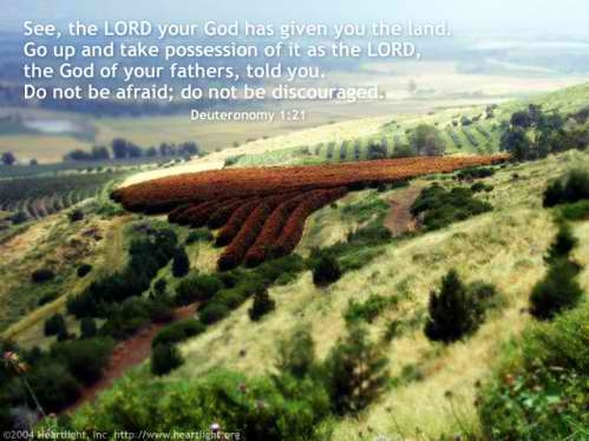The Book of Deuteronomy

The word "Deuteronomy" means "repetition of the law." The name literally means “Second Law”. Moses gives “the Law” for the second time. After forty years the Israelites were about to enter Canaan. But before they did, Moses wanted to remind them of their history, all that God had done for them, and the laws they had to continue to obey as God's chosen people. The book was written shortly before Moses' death in about 1406 B.C. Moses reminded the people of God's goodness to them-how God was with them throughout their journey and gave them the land of Canaan. He also summarized God's laws, including the Ten Commandments. One subject that pervades the whole book is the love relationship of the Lord to His people and that of the people to the Lord as their sovereign God.

Joshua Commissioned by God
31:23, "Then He commissioned Joshua the son of Nun and said, "Be strong and courageous, for you shall bring the sons of Israel into the land which I swore to them, and I will be with you."
In chapters 1-4, Moses reviews some of the details of the past history of
Israel such as the Exodus and the wandering in the wilderness. He then urges that they obey the Laws of God.
Then, in chapters 5-28 Moses restates the Ten Commandments to the
Israelites. Moses explains the principles and instructions for living a Godly life as God’s chosen nation. These include how to love the Lord, laws of worship, laws regarding relationships (like divorce), and also the consequences and penalties if these laws are broken.
Chapters 29-30 there is a move to commit themselves, as a nation, and to
stand apart unto God. This consists of not only knowing the many laws that God has commanded, but also obeying them and placing God first.
Finally, in chapter 31 through 34, we see the first change in leadership in
Israel. Moses, the one who has been leading them the entire time, hands over his authority to Joshua, and commissions him. Moses blesses the tribes, which reminds us of Jacob blessing his sons almost 450 years earlier. In the last chapter, God shows Moses the promise land, although he cannot enter it, after this, Moses the servant of the Lord dies on Mt. Nebo.
The Foreshadowing of Jesus
The book of Deuteronomy was quoted over 90 times in the New Testament.
In 1:23, Moses chooses 12 men, one man for each tribe.
In Mark 3:14, Jesus appointed 12 men, so that they could be with Him and that He could send them out to preach.
In Deuteronmy 18:15-18, Moses says, "The Lord your God will raise up for you a prophet like me from among you, from your contrymen, you shall listen to him. This is according to all that you asked of the Lord your God in Horeb on the day of the assembly, saying, 'Let me not hear again the voice of the Lord my God, let me not see this great fire anymore, or I will die.' The Lord said to me, 'They have spoken well. I will raise up a prophet from among their countrymen like you, and I will put My words in his mouth, and he shall speak to them all that I command him.'
Moses (led by God) commissions Joshua to lead Israel into the promised land toward the end of Deuteronomy (31:23). The name “Joshua” is translated from the Hebrew “Yehoshua” — which is the same name that is translated “Iesous” in the Greek Septuagint. In our English New Testament Bibles, the name “Iesous” is translated “Jesus”. The name of Joshua’s father — Jehozadek - means “Jehovah Righteousness”.
(34:5) Moses dies on Mount Nebo and is not able to lead God’s people into the promised land. Instead, it is a man by the name of Joshua that leads God’s people into the promised land. Now, Moses is regarded in many parts of Scripture as being the embodiment of the Law. This is significant because one of the key themes of the New Testament Gospel is that the Law cannot lead God’s people into the promised land. Instead it is Jesus – or Joshua — who takes the place of the Law in leading the people of God into the promised land.
continue to Joshua....